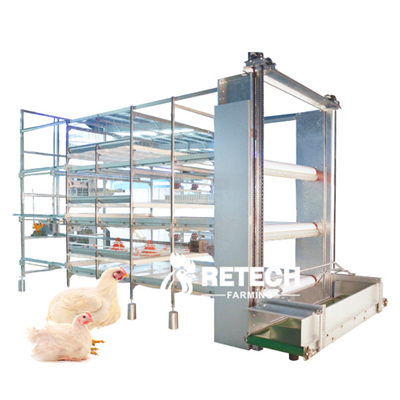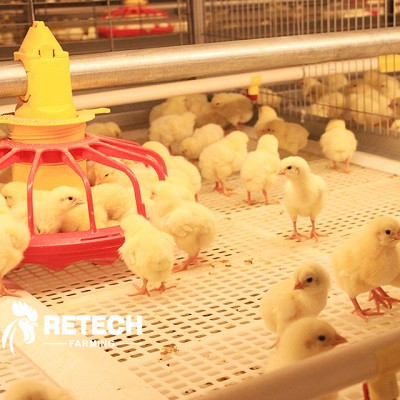Chicken farmers should focus on the following aspects:
1. After the last batch of broiler chickens are released, arrange the cleaning and disinfection of the chicken house as soon as possible to ensure enough free time.
2. The litter should be clean, dry and smooth. At the same time to be disinfected.
3. Keep the same batch of broiler chickens in the same coop to prevent cross-infection of diseases.
4. Raise the temperature at least 24 hours in advance so that the temperature of the floor litter is 32-35°C.
5. Whether it is bedding support or online support, all-in and all-out should be advocated.
6. Density: Under normal circumstances, the stocking density is 8/square meter, which can be appropriately increased to 10/square meter in winter, and 35 per square meter at the beginning of broiler chickens brooding. It is recommended that the 7-day-old, 14-day-old, and 21-day-old groups be expanded once respectively.
7. Temperature: Because the thermal regulation system of the broiler chicks is not yet fully developed, some heating systems need to be provided to heat the chicks. Particular attention should be paid to whether chick behavior is consistent with house temperature.
8. Lighting: There are many lighting programs that are called the most scientific. We must choose the lighting program that suits us.
9. Humidity: Relatively high humidity should be maintained for 1-2 weeks in the early stage, and relatively low humidity should be maintained from 3 weeks of age to slaughtering. The reference standard is: 1-2 weeks, the relative humidity can be controlled at 65%-70%, and then controlled at 55% %-60%, the minimum is not less than 40%.
10. Ventilation: Continued high concentrations of harmful gases (such as ammonia, hydrogen sulfide, carbon monoxide, carbon dioxide and dust, etc.) can lead to anemia in chickens, weakened physique, decreased production performance and disease resistance, and easily induced respiratory diseases. and ascites, causing huge losses to broiler production. Ventilation requirements: broilers need good ventilation throughout the breeding cycle, especially in the later period of rearing.
Control method: The broiler chickens brooding room is closed for the first 3 days of brooding, and the top ventilation hole can be opened later. In summer and autumn, open doors and windows appropriately according to the outside temperature, but prevent the cold air from blowing directly to the chicks; raise the house temperature by 2-3°C before ventilating in the cold season, and use the noon and afternoon when the outside temperature is high to properly open the window to the sun for ventilation ventilation.
Matters needing attention: It is necessary to strictly prevent gas poisoning; as the weight of broilers gradually increases, the ventilation volume should also increase; the ventilation volume should be increased as much as possible under the premise of ensuring the temperature; strictly prevent the invasion of thieves.
11. Selection of feed: The cost of feed accounts for about 70% of the cost of the entire broiler. The choice of feed is directly related to the economic benefits of broiler raising. The core of the problem is which feed is best for feeding, and you can do some comparative experiments on which feed to use.
12. Management from the growing period to the slaughtering period: The core of raising during the growing period and the slaughtering period is to produce the most chickens that meet the product requirements under reasonable feed consumption. One of the most prominent problems in the management of this period is to properly control the weight gain and reduce the death of broiler chickens caused by excessive growth in the later period. For broilers with a larger body weight, the early body weight should be appropriately reduced to achieve the expected performance.
13. Precautions for immunization: The immunization method of broiler chickens is often neglected, and diseases are prone to occur in the later stage. Therefore, it is recommended to take live vaccines in the form of eye drop, nasal drop, spray and drinking water immunization.
Post time: May-16-2022









